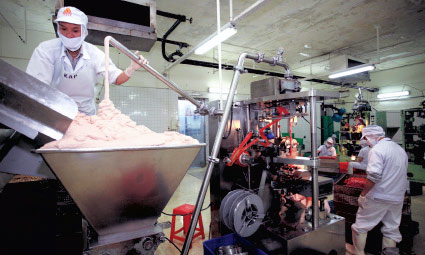VietNamNet Bridge – The decision by the State Bank of Vietnam to float the interest rates has made businesses worried. Businessmen say they have been put under hard pressure which has forced them to reconsider the borrowing and the business plan for 2011.

Businesses fear they may shrink because of floating interest rate
In principle, floating interest rates is an effective solution to stabilize the exchange rate and inflation rates, while allowing banks to take initiative in lending and mobilizing capital. However, this has raised worries among businesses that the interest rates will escalate and make business unprofitable.
Tran Van Lieng, General Director of Vietnam Cocoa Company, said that many businesses would go bankrupt because the profit they can earn is not high enough to pay bank interest rates. In such circumstances, it would be more profitable to deposit money at banks than doing business.
The owner of a construction company said that many enterprises in the same sector now have to pay the interest rates of 19-20 percent. Therefore, the more they borrow to expand production, the bigger losses they will incur.
Nguyen Huu Dang, General Director of HD Bank, on one hand, admitted that the lending interest rate has become too high for businesses, but on the other hand, said that banks alone cannot decide the rates. By this he means that the interest rates will not go down unless there is change in the capital supply and demand, the inflation rate, exchange rate and the economic growth.
In order to find a solution to this situation, many businesses have thought of mobilizing capital by issuing stocks, bonds or seeking capital from investment funds. However, it is clearly not so easy to mobilize capital from non-bank channels.
Meanwhile, some worry that the 2008 scenario may repeat in 2010. In that year, the medium and long term lending interest rate climbed to 20-24 percent, putting many businesses under the threat of bankrupcy.
Seeking opportunities in difficulties
Facing such difficulties, many businesses have decided not to expand and keep their production at moderate level. However, big businessmen think that halting investments now would do no good.
Tran Kim Thanh, Chair of Kinh Do Group, which operates in four sectors, food processing, retailing, real estate and finance investment, said that despite of the difficulties ahead, he will still continue his investments.
He believes that 2011, despite its challenges, will be the good time for the enterprises which haveprepared well for the post-crisis period.
CIC8, an investment and construction company, also thinks this way. Huynh Huu Phuoc, General Director, said that businesses would still be able to survive and develop, if they have good models and plans to follow.
Phuoc anticipates that the interest rate in the first quarter of 2011 would be very high. However, with its advantages in the land fund and reasonable methods of mobilizing capital from clients, Phuoc believes that CIC8 will not be influenced by the high interest rates. He believes that the turnover of the company in 2011 would be double that in 2010.
Cooperating to survive the storm
Van Duc Muoi, General Director of Vissan, a food processing company, said that it is now the time for enterprises to use their strengths from other sources to optimize profit. Vissan, for example, in the past, covered everything, from production to retailing. However, it now only takes care of production and distribution, while the retailing is left to supermarkets, andit will rely on private merchants for the supply of raw materials?.
Muoi said that Vissan is now “shaking hands” with Kinh Do Group. Under the cooperation, Kinh Do’s chain will sell Vissan’s products andvice versa, Vissan’s chain will sell Kinh Do’s products.
Phu Cuong group, which once relied on exports, after realizing the big potentials of the domestic market, has decided to develop its distribution network
Phu Cuong has signed contracts with four retailers Satra, Sagrifood, Saigon Co.op and An Phong Company..
Doanh Nhan Saigon